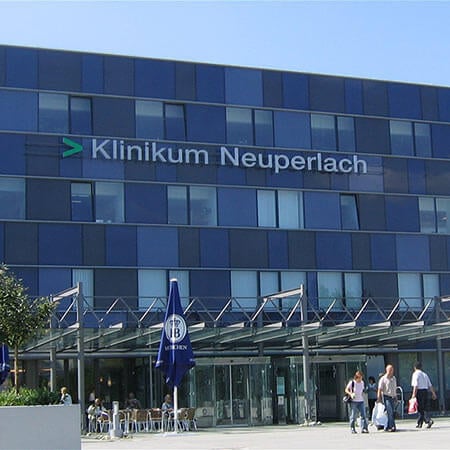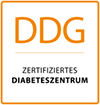Type 2 diabetes mellitus is the most common endocrine disorder. The pathology can be caused by obesity and the impaired tissue sensitivity to insulin. As a result, chronic hyperglycemia (elevated blood glucose levels) develops, which over time leads to inadequate blood supply to the internal organs and nerve-ending lesions.
Doctors in Germany successfully deal with the treatment of type 2 diabetes mellitus. The specialists can compensate for carbohydrate metabolism with drugs, prevent and treat complications of diabetes mellitus, and perform bariatric surgery for obesity treatment.
Content
- Conservative treatment of type 2 diabetes mellitus
- Treatment of complications
- Management of obesity
Type 2 diabetes mellitus is treated with medications. Pills, injectable drugs, and stem cells are used to combat complications, and sometimes endovascular procedures and operations may be required. In severe obesity, the specialists perform bariatric surgery, which leads to weight loss and improved carbohydrate metabolism.
You can undergo your treatment in one of the following hospitals: University Hospital of Ludwig Maximilian University of Munich, Hospital Neuperlach Munich, or University Hospital Carl Gustav Carus Dresden.
Please leave your request on the Booking Health website, and we will fully arrange your trip. We will recommend a highly specialized clinic for drug therapy or surgical treatment, and we will tell you about the innovative treatment methods. You will receive your treatment in a short time, without a long waiting period. The prices for you will be the same as for German citizens. You will be constantly accompanied by your medical interpreter in the clinic.
Conservative treatment of type 2 diabetes mellitus
Lifestyle modification is the mainstay of treatment for diabetes mellitus type 2. In most cases, it helps to bring the disease under control even without any medications or with a minimal need for drugs.
The key recommendations are as follows:
- regular physical activity;
- a low-carb diet, especially with a minimal intake of simple sugars;
- weight loss activities.
The fight against obesity is crucial since it is a body weight gain that entails impaired carbohydrate metabolism. With weight loss, glucose levels may drop to their normal indicators.
If the appropriate glycemia cannot be achieved through lifestyle changes, then doctors use medications.
Metformin is the first-line drug. Many patients can achieve normal blood glucose levels with a single drug. The dose is increased gradually, bringing it up to the one that is well tolerated on the one hand, and controls glucose metabolism on the other.
Other hypoglycemic agents can be added to the therapy regimen if metformin alone is not enough. The doctors use sulfonylureas, dipeptidyl peptidase-4 inhibitors, glucagon-like peptide-1 (GLP-1) receptor agonists, sodium-glucose co-transporter-2 (SGLT2) inhibitors, or alpha-glucosidase inhibitors.
Drugs to reduce cardiovascular risk include SGLT2 inhibitors and GLP-1 receptor agonists.
Insulin is required for decompensated type 2 diabetes mellitus when pancreatic beta cells are depleted and a deficiency of this hormone develops. Insulin is administered with injections. In addition, doctors in Germany can implant an insulin pump, which makes the treatment more convenient for the patient.
The therapy is controlled with laboratory diagnostics. For the patient not to develop complications, the glycated hemoglobin levels should not exceed 7%.
Treatment of complications
Persistent hyperglycemia in uncontrolled diabetes mellitus can cause a number of complications, both acute and chronic. Diabetes mellitus is one of the leading causes of cardiovascular disease, blindness, kidney failure, and lower limb amputation.
Acute complications include hypoglycemia, diabetic ketoacidosis, hyperosmolar hyperglycemic state, and diabetic coma.
Chronic microvascular complications include nephropathy, neuropathy, and retinopathy, while chronic macrovascular complications include coronary artery disease, peripheral arterial disease (atherosclerosis), and cerebrovascular disease (lesions of the cerebral blood vessels).
The patients with complications require additional treatment. Prescribing antihypertensive drugs and statins helps the patients correct their blood pressure and lower their blood cholesterol levels to slow the development of atherosclerosis. Stem cell therapy helps to restore the damaged nerves and blood vessels. Endovascular procedures or surgery may be required to restore blood supply to the heart and lower limbs. Doctors in German clinics prefer minimally invasive treatment options with a short rehabilitation period, if possible.
Management of obesity
Obesity is the leading cause of type 2 diabetes mellitus. The higher the body weight, the worse the carbohydrate metabolism, and the more drugs are required to control it.
Weight loss can be achieved through diet and physical activity. If this is not enough, doctors prescribe medications. Basically, two groups of drugs can be used: those that violate the digestion of fats or those that suppress the patient's appetite.
Sometimes this is not enough, especially in grade 3 obesity. The specialists then resort to invasive procedures and surgical interventions. The patients undergoing their treatment in Germany can have an intragastric balloon placement procedure, undergo mini-gastric bypass surgery, sleeve gastroplasty, or endoscopic gastroplication. German doctors perform laparoscopic operations through short abdominal incisions or endoscopic operations from inside the stomach. They are sparing and safe, providing rapid weight loss. Even if the disease is not cured completely, the fight against obesity still brings some benefits: the need for drugs is reduced, and the risk of complications decreases.
You can undergo your treatment for diabetes mellitus type 2 in Germany to normalize your carbohydrate metabolism and avoid complications. You are kindly welcome to use the Booking Health service to see the prices for treatment, select the best clinics in Germany, compare the cost of treatment in different hospitals and make an appointment for your treatment at the best price. The specialists of the Booking Health company will help you to find the best Endocrinology Centers and arrange your trip.
Authors:
The article was edited by medical experts, board-certified doctors Dr. Vadim Zhiliuk and Dr. Sergey Pashchenko. For the treatment of the conditions referred to in the article, you must consult a doctor; the information in the article is not intended for self-medication!
Sources:
National Center for Biotechnology
The Lancet
















